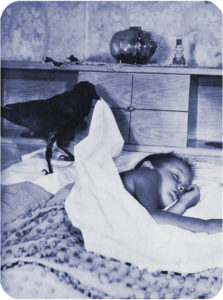|
The following vignettes are from Nights Redolent Of Death, a collection of dreamlike prose by Greek writer Costas Despiniadis, translated by Konstantina Georganta |

The Room
Night. Cold. I am walking around smoking, huddled up in my jacket. A soft rain has started. I turn into a small alley not knowing why. It’s not my usual route and I have probably never been here before. The alley is dark, quiet. Mud and water in puddles. The more I walk, the narrower the alley becomes. No houses on its sides, only high walls. I am under the impression that it is a dead end, but the thought of going back where I came from never crosses my mind. I keep on walking in absolute darkness. On my right, a small door. I open it and enter a low-ceilinged room. It’s empty and barely lighted by a candle in a corner. The room has a wall with three doors. The right and left ones are padlocked. I open the middle one, and what I find before me is a sign with huge red letters reading NIGHTS REDOLENT OF DEATH. I shut the door terrified, looking for the way out of the room. To my surprise, there is no door anymore. The empty room is now filled with books and papers, piles and piles of them, which I knock with my every move, and they drop down on my feet. In a minute, it is impossible for me to walk with all of these books lying around. I stand still in the middle of the room. I pick up a book and open it. All its pages are blank. I throw it away and pick up another. Same. I start going through all the rest in a frenzy. It takes me a moment to realize that no book has anything written in it. I want to escape this small room, but there is no door. I suddenly feel a cool breeze on my neck. I cannot understand where this breeze is coming from, as there are no doors and no windows anywhere. The breeze grows stronger. The candle is blown out and the room is sunk in absolute darkness.
The Lollipop
Night. I am sitting on a bench at the beach looking at the sea. There is an old lady nearby dressed in old rags selling lollipops in all colours on a half-wrecked cart. A little girl in dirty clothes, one of those selling tissues in the streets, passes by and stares at the cart. The old lady takes a lollipop and offers it to her. The little one hesitates. ‘Take it, my treat,’ the old lady says. The girl takes it with a smile, says ‘thank you,’ and goes away quickly holding the whole world in her two hands. A little farther down the road she meets someone, must be her father, who shouts at her like a madman in a language I do not understand and slaps her. The lollipop falls out of her hand and the little one starts crying. She tries to pick it up from the ground, but her father pulls her angrily by the hand and they walk away.
The Cat
It’s a quiet December night. Snow has been falling outside since early morning. I am sitting at my desk, reading. The radio can be heard in the background; a pointless political talk is on. Suddenly, my cat, lying until that moment unconcerned on his little rug, gets up, leaps and lands on a small bookcase right beneath the window. He is staring at something, staying still for a long time. Since all is quiet outside, I cannot really tell what he is looking at, so I return to my book, smiling at his ‘folly.’ Secretly, however, I am envious. What I wouldn’t give, if only for a moment, to look calmly at the snow falling in thick darkness. What I wouldn’t give, if only for a moment, for All Human To Be Alien To Me.
The Sparrow
I am crossing N. Square together with my friend T. We find a wounded sparrow trying to fly in vain. We decide to take it to a vet or an animal rescue. It’s Sunday and nobody is answering our calls. After many tries, K is the one who finally answers the phone and offers to help. A young blond kid with shiny blue eyes, who was playing right next to us, brings us a carton box. We punch three or four holes in it, pick up the wounded bird softly, and place it inside. We call a taxi, and just before T and I are about to go in, the kid looks me in the eyes and tells me with sorrow: ‘I so wish for the little bird to survive, Sir.’ ‘It will survive,’ I assure him, stroking his head, and I shut the door. In a little while, we are at the Nt. neighbourhood. We locate K and hand him the wounded sparrow. He examines it carefully. ‘Its eye, wing, and most probably its spine too are hurt,’ he tells us, adding, ‘It has a minor chance of surviving, but leave it with me and I’ll see what I can do.’ In three days I call K and ask him about the sparrow. ‘It died a few hours after you brought it to me,’ he answers.
A few days later I happen to pass by N. Square again. In the distance I see the kid who had helped us with the little bird approaching me, running. ‘What happened, Sir, did the bird survive?’ he asks with sincere agony. ‘It has survived, it has thanks to you,’ I answer, trying to avoid his eyes.
—About the author, Costas Despiniadis





Leave a Reply